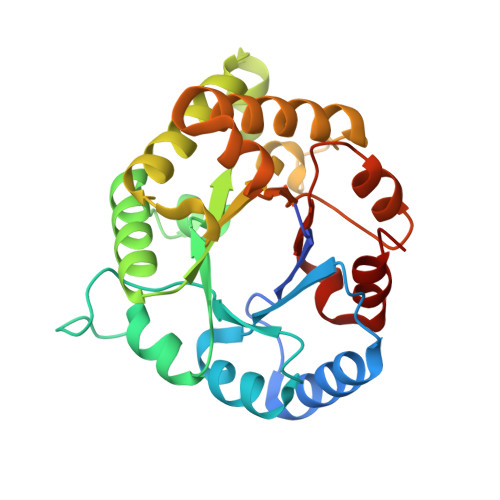Triosephosphate isomerase I170V alters catalytic site, enhances stability and induces pathology in a Drosophila model of TPI deficiency.
Roland, B.P., Amrich, C.G., Kammerer, C.J., Stuchul, K.A., Larsen, S.B., Rode, S., Aslam, A.A., Heroux, A., Wetzel, R., VanDemark, A.P., Palladino, M.J.(2015) Biochim Biophys Acta 1852: 61-69
- PubMed: 25463631
- DOI: https://doi.org/10.1016/j.bbadis.2014.10.010
- Primary Citation of Related Structures:
4POC, 4POD, 4ZVJ - PubMed Abstract:
Triosephosphate isomerase (TPI) is a glycolytic enzyme which homodimerizes for full catalytic activity. Mutations of the TPI gene elicit a disease known as TPI Deficiency, a glycolytic enzymopathy noted for its unique severity of neurological symptoms. Evidence suggests that TPI Deficiency pathogenesis may be due to conformational changes of the protein, likely affecting dimerization and protein stability. In this report, we genetically and physically characterize a human disease-associated TPI mutation caused by an I170V substitution. Human TPI(I170V) elicits behavioral abnormalities in Drosophila. An examination of hTPI(I170V) enzyme kinetics revealed this substitution reduced catalytic turnover, while assessments of thermal stability demonstrated an increase in enzyme stability. The crystal structure of the homodimeric I170V mutant reveals changes in the geometry of critical residues within the catalytic pocket. Collectively these data reveal new observations of the structural and kinetic determinants of TPI Deficiency pathology, providing new insights into disease pathogenesis.
- Department of Pharmacology & Chemical Biology, University of Pittsburgh School of Medicine, Pittsburgh, PA 15261, USA; Pittsburgh Institute for Neurodegenerative Diseases (PIND), University of Pittsburgh School of Medicine, Pittsburgh, PA 15261, USA.
Organizational Affiliation:


















